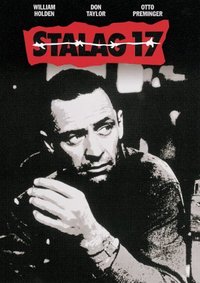Stalag 17
Stalag 17 is a 1953 film which tells the story of a group of Allied soldiers held in a German World War II prisoner of war camp who come to believe one of their number is a traitor. more...
It starred William Holden, Don Taylor, Otto Preminger, Robert Strauss, Harvey Lembeck (Strauss and Lembeck both appeared in the Broadway production) and Peter Graves.
The movie was adapted by Billy Wilder and Edwin Blum from the play by Donald Bevan and Edmund Trzcinski. It was directed by Wilder. The storyline is dramatic, skillfully interspersed with ironic and comedic references to 1940s American wartime culture which serve to develop the characters and realistic setting.
It won the Academy Award for Best Actor in a Leading Role (William Holden) and was nominated for Best Actor in a Supporting Role (Robert Strauss) and Best Director.
Holden's acceptance speech for his Academy Award was the shortest on record: "Thank you."
Plot Synopsis
Although the date is never revealed, Stalag 17 is set in the weeks surrounding Christmas, 1944. The German prisoner-of-war camp, Stalag 17, is located somewhere along the Danube in Southern Germany. The film is narrated by Clarence Harvey Cook, aka, "Cookie," who tells the story of a spy that has been operating in Barracks Four, where he lives. On the night when the film opens, two prisoners from Barracks Four, Manfredi and Johnson, are planning to escape through a tunnel the company has dug under the barbed wire. They are discovered and shot on sight. A mystery surrounds the situation: how did the Germans find out about the tunnel?
Events lead the other men to one of their fellow inmates, Sefton (William Holden). Sefton enjoys a life that's luxurious compared to his comrades; he barters openly with the Germans for eggs, silk stockings, blankets. The other prisoners are, of course, envious and, even more so, suspicious of Sefton's dealings with their enemy. Sefton himself is a rather cold and impersonal sergeant; he bets on whether Manfredi and Johnson will actually escape, then trades the cigarettes he won from his comrades to the Germans for an egg the next morning.
The plot meanders for a while, showing the lives of the prisoners; they receive mail, eat horrible food, are forced to wash in the latrine sinks, are forced out of the barracks during bombing raids and collectively defy the will of the camp's cruel and ruthless commandant, Otis von Scherbach (Otto Preminger). They use a ham radio (shared by all the barracks) to pick up the BBC and the war news. (The antenna is the net for their volleyball court.) Their "supervisor" Sergeant Schultz (Sig Ruman), finds the radio and confiscates. The mystery surrounding the "stoolie's" identity grows.
When Sefton is permitted to spend a night in the women's barracks in the Russian section of the camp, amidst the beautiful women the other prisoners watch through Sefton's telescope, the men conclude that this was a reward Sefton received for informing the Germans of the radio. When he returns to his barracks he is accused of being a spy and is unable to convince his comrades that he isn't the man they're looking for. At that moment, Commandant von Scherbach pays a personal visit to the barracks to apprehend Lieutenant John Dunbar (Don Taylor), who is suspected of sabotaging a German ammunition train shortly before he arrived at Stalag 17. The other men are convinced that Sefton is the spy and viciously beat him.
Read more at Wikipedia.org



